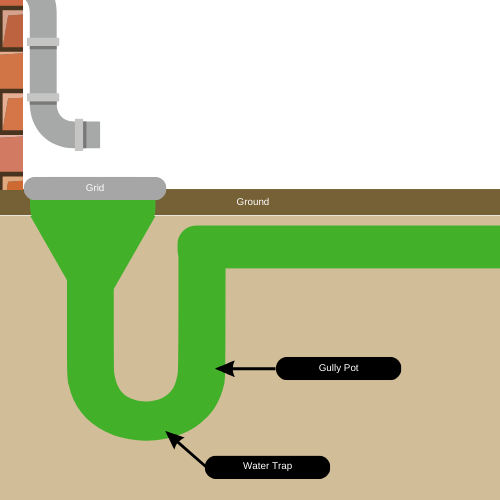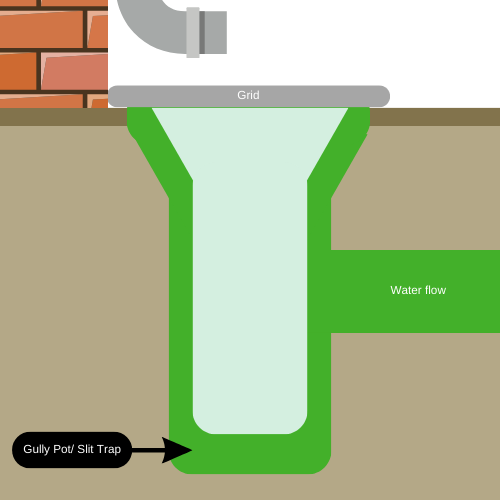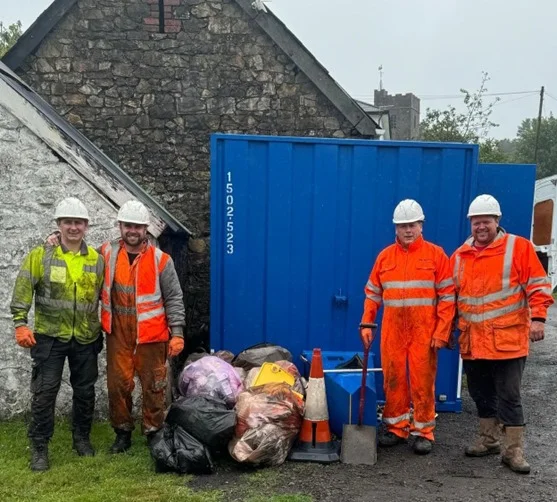Gullies are an essential part of any property’s water management system.
A gully is a drainage fitting with an open top, a specific base and one or more outlets to the side (as pictured). There are mutliple types of gullies which can be used to connect wastewater, stormwater or rainwater outlets to suitable drains. Gullies can be used to drain surface water from areas that are susceptible to flooding.
There are two main categories for gullies, road and domestic.
While removing water is the main use of a gully, they have a number of secondary purposes. Gully drains can assist in stopping and preventing bad smells, as well as deter rodents from escaping or entering the drain. While gullies are designed to stop blockages in the waste water management system by preventing leaves and twigs from entering, this doesn’t mean that are able to avert all blockages and don’t get blocked themselves.
Where are gullies found?
Gullies are needed wherever there is water discharge point(s) around the outside of the property to collect surplus run-off and direct it back into the foul water system. The most common places to find gullies include:
– Rainwater downpipes
– Patio areas
– Outside taps
– External discharge pipes (dishwasher, washing machines, etc)
With a combined drainage system all wastewater, stormwater and surface water is most likely discharged into one drainage system and carried away to a single destination. A combined drainage system is most commonly seen in a property pre-dating 1970.
Properties after 1970 are probable to have 2 seperate systems, one for wastewater which is carried to the main sewer system and another to carry surface water and rainwater to a watercourse. By having 2 seperate systems, this puts less pressure on the mains sytem and prevents clean and dirty water mixing.
All gullies work on the same concept despite location defining the purpose, it is only the designs of the gully trap that changes.
Types of Gullies
Road Drainage Gullies
Road gullies are designed to discharge surface water from all roads where large volumes of surface water can build-up.
Road gullies are more powerful than domestic gullies as they have to withstand heavier traffic environments.
Domestic Drainage Gullies
Domestic gullies release surface water from gardens, rainwater from guttering and wastewater from washing machines etc to the appropriate drains. Comprised of grating or grid that prevents unwanted debris entering drains and water traps that hold water to prevent odours resurfacing.
P Trap gully
The P trap gully is a length of pipe shaped like the letter “P”. It is mostly used to collect rainwater from a downspout when connected to grated drainage fitting called a hopper. If a P shaped gully or the conencting drains get blocked, the drain cannot be unblocked with a drainrod.

Bottle Trap Gully
Unlike the P trap gully, a bottle gully solves the rodding problem as the bottle gully doesn’t have a tight bend to trap the water. Instead, the water in forced up to reach the outlet pipe through a central chamber where there’s a space between the chamber and the wall of the gully. The removable sleeve makes cleaning debris easier and provides direct access to the outlet for a drain rod if there is a blockage.

Prevention and Maintenance
Gully maintenance is vital in preventing blockages from occuring. Road gullies are maintained by the local council whereas domestic gullies are maintained by the property owner. By regularly sweeping around gully grids and clearing out gutters routinely, it is less likely to cause blockages.
One of the basic ways to check a gully can be done by inspecting the grates for debris and/or slow flowing water. Gullies can get blocked by leaves, twigs, and other debris.
If the gully is blocked then the blockage must be cleared quickly to avoid flooding. The main signs of gully blockages include:
– Overflowing
– Slow draining
– Bad odour
Clearing a blocked gully without professionals would risk in pushing the blockage further into the drainage system, displacing the pipe and possibly making the problem worse. Metro Rod provide pre-planned maintenance that can be catered to the needs of any property.

Talk to your local Metro Rod specialist
We are always happy to arrange a free site assessment and no obligation quotations for any work you might need. Alternatively, you can call our emergency hotline number on 0800 66 88 00
Get in touch Drainage Services
